
Murray Newton Rothbard was an American economist of the Austrian School, economic historian, political theorist, and activist. Rothbard was a central figure in the 20th-century American libertarian movement, particularly its right-wing strands, and was a founder and leading theoretician of anarcho-capitalism. He wrote over twenty books on political theory, history, economics, and other subjects.
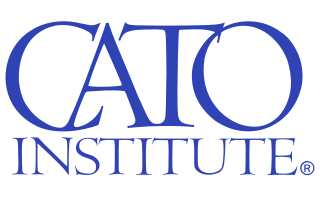
The Cato Institute is an American libertarian think tank headquartered in Washington, D.C. It was founded in 1977 by Ed Crane, Murray Rothbard, and Charles Koch, chairman of the board and chief executive officer of Koch Industries. Cato was established to focus on public advocacy, media exposure and societal influence.

Hans-Hermann Hoppe is a German-American academic associated with Austrian School economics, anarcho-capitalism, right-wing libertarianism, and opposition to democracy. He is professor emeritus of economics at the University of Nevada, Las Vegas (UNLV), senior fellow of the Mises Institute think tank, and the founder and president of the Property and Freedom Society.
Paleolibertarianism is a libertarian political activism strategy aimed at uniting libertarians and paleoconservatives. It was developed by American anarcho-capitalist theorists Murray Rothbard and Lew Rockwell in the American political context after the end of the Cold War. From 1989 to 1995, they sought to communicate libertarian notions of opposition to government intervention by using messages accessible to the working class and middle class people of the time. They combined libertarian free market views with the cultural conservatism of paleoconservatism, while also opposing protectionism. The strategy also embraced the paleoconservative reverence for tradition and religion. This approach, usually identified as right-wing populism, was intended to radicalize citizens against the state. The name they chose for this style of activism evoked the roots of modern libertarianism, hence the prefix paleo. That founding movement was American classical liberalism, which shared the anti-war and anti-New Deal sentiments of the Old Right in the first half of the 20th century. Paleolibertarianism is generally seen as a right-wing ideology.

Edward E. Clark is an American lawyer and politician who ran for governor of California in 1978, and for president of the United States as the nominee of the Libertarian Party in the 1980 presidential election.

David Hamilton Koch was an American businessman, political activist, philanthropist, and chemical engineer. In 1970, he joined the family business: Koch Industries, the second largest privately held company in the United States. He became president of the subsidiary Koch Engineering in 1979 and became a co-owner of Koch Industries in 1983. Koch served as an executive vice president of Koch Industries until he retired due to health issues in 2018.
Edward Harrison Crane is an American libertarian and co-founder of the Cato Institute. He served as its president until October 1, 2012.
George Hamilton Smith was an American author, editor, educator, and speaker, known for his writings on atheism and libertarianism.
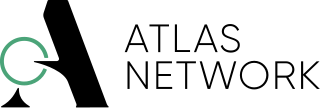
Atlas Network, formerly known as Atlas Economic Research Foundation, is a non-governmental 501(c)(3) organization based in the United States that provides training, networking, and grants for libertarian, free-market, and conservative groups around the world.
Williamson M. "Bill" Evers is a former American libertarian activist and education researcher. In 1988, he became a resident scholar at Stanford University's Hoover Institution first as a national fellow, then as a visiting scholar, and most recently as a research fellow there and at The Independent Institute. He went on leave from Hoover to serve as Assistant Secretary for the Office of Planning, Evaluation and Policy Development in the United States Department of Education in 2007 to 2009. At the beginning of September 2016, he was selected to lead the "agency action team" for the Department of Education in the Trump-Pence transition.
The Cato Journal was a triannual peer-reviewed academic journal that covered public policy from an Austro-libertarian point of view. It was established in 1981 and published by the Cato Institute. It published articles discussing politics and economy. The journal was a "free-market, public policy journal ... for scholars concerned with questions of public policy, yet it is written and edited to be accessible to the interested lay reader". The final editor-in-chief was James A. Dorn. The final issue was released in 2021.
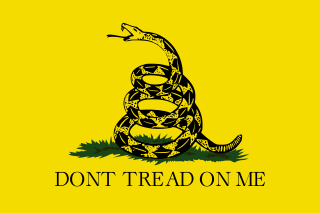
In the United States, libertarianism is a political philosophy promoting individual liberty. According to common meanings of conservatism and liberalism in the United States, libertarianism has been described as conservative on economic issues and liberal on personal freedom, often associated with a foreign policy of non-interventionism. Broadly, there are four principal traditions within libertarianism, namely the libertarianism that developed in the mid-20th century out of the revival tradition of classical liberalism in the United States after liberalism associated with the New Deal; the libertarianism developed in the 1950s by anarcho-capitalist author Murray Rothbard, who based it on the anti-New Deal Old Right and 19th-century libertarianism and American individualist anarchists such as Benjamin Tucker and Lysander Spooner while rejecting the labor theory of value in favor of Austrian School economics and the subjective theory of value; the libertarianism developed in the 1970s by Robert Nozick and founded in American and European classical liberal traditions; and the libertarianism associated with the Libertarian Party, which was founded in 1971, including politicians such as David Nolan and Ron Paul.

Spiked is a British Internet magazine focusing on politics, culture and society. The magazine was founded in 2001 with the same editor and many of the same contributors as Living Marxism, which had closed in 2000 after losing a case for libel brought by ITN.
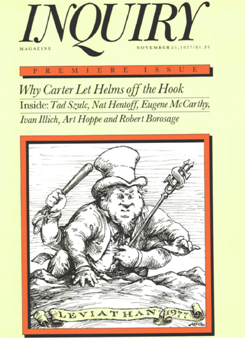
Inquiry Magazine, sometimes titled Inquiry: A Libertarian Review, was a libertarian magazine published from November 1977 to 1984. It was originally published by the Cato Institute, then later transferred to the Libertarian Review Foundation.
Students for a Libertarian Society (SLS) was an activist organization for students in the United States seeking to promote libertarian ideals on college campuses. Currently active libertarian student groups include Students for Liberty and Young Americans for Liberty.
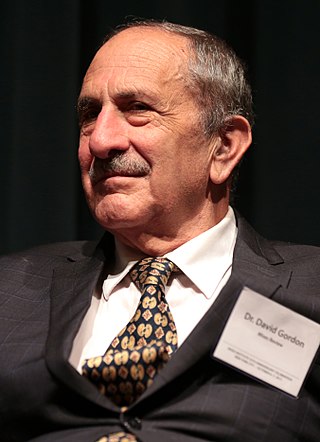
David Gordon is an American libertarian philosopher and intellectual historian influenced by Murray Rothbard's views of economics. He is a senior fellow of the Ludwig von Mises Institute, a libertarian think tank, and is the editor of The Mises Review.
The Koch family is an American family engaged in business, best known for their political activities and their control of Koch Industries, the 2nd largest privately owned company in the United States. The family business was started by Fred C. Koch, who developed a new cracking method for the refinement of heavy crude oil into gasoline. Fred's four sons litigated against each other over their interests in the business during the 1980s and 1990s.
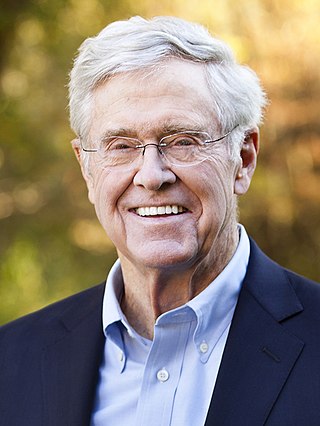
Charles G. and David H. Koch (1940–2019), sometimes referred to as the Koch brothers, have become famous for their financial and political influence in United States politics with a libertarian, more specifically, right-libertarian or American-style libertarian political stance. From around 2004 to 2019, with "foresight and perseverance", the brothers organized like-minded wealthy libertarian-oriented conservatives, spent hundreds of millions of dollars of their own money to build an "integrated" and "stealth" network of think tanks, foundations, "grassroots" movements, academic programs, advocacy and legal groups to "destroy the prevalent statist paradigm" reshape public opinion to favor minimal government. As of mid 2018, the media has been encouraged to refer to the "Koch network" rather than the "Koch brothers".

Charles de Ganahl Koch is an American billionaire businessman. As of February 2024, he was ranked as the 23rd richest man in the world on the Bloomberg Billionaires Index, with an estimated net worth of $64.9 billion. Koch has been co-owner, chairman, and chief executive officer of Koch Industries since 1967, while his late brother David Koch served as executive vice president. Charles and David each owned 42% of the conglomerate. The brothers inherited the business from their father, Fred C. Koch, then expanded the business. Koch Industries is the largest privately held company by revenue in the United States, according to Forbes.
The Niskanen Center is an American think tank based in Washington, D.C. that advocates environmentalism, immigration reform, civil liberties, and strengthening social insurance around market-oriented principles. Named after William A. Niskanen, an economic adviser to Ronald Reagan, it states that its "main audience is Washington insiders", and characterizes itself as moderate. The organization has been credited with fostering bipartisan dialogue and promoting pragmatic solutions to contemporary political challenges on issues such as family benefits, climate change, and criminal justice reform.











